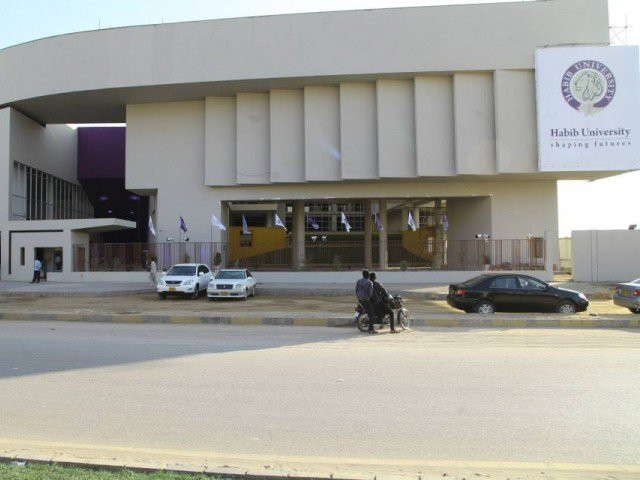Muslim inkpots are running dry, says Toledo University professor
Habib University hosts talk with Sayed Amjad Hussain on 'Past Glories and Current Realities'

PHOTO: HABIB UNIVERSITY FACEBOOK PAGE
Hussain, professor emeritus of thoracic cardiovascular surgery at the University of Toledo's College of Medicine, was born in Peshawar in a house nestled within its famous Qissa Khwani Bazaar. He was invited by Habib University to give a talk on 'Past Glories and Current Realities', in which he spun a tale of glory and historic convergence of the Muslims from the time of Abbasid in Baghdad, to Fatimid in Egypt, Ummayyads in Spain and to an extent Mughals in India.
K-P govt under fire for ad-hoc teachers
"It was a time when our inkpots were not dry and the Muslims excelled" not only in scientific research but also in the scholarly knowledge of Ijtehad, he said, that one-eighth of the Quranic text tells people to study nature, reflect on ourselves, use reason and finally acquire knowledge for the sake of a better community.
"Famous Imams of various schools of thoughts have broken the norms of traditional rules and have led to better reasoning in their times," he said. "Muslims today must decide if they plan to change Darul Islam to Darul Harb." For it is unto us, he stated. "What we know and what we see. Why then and not now? If not now, then when?"
According to Hussain, it was those five Imams who gave the real meaning to Ijtehad, with sincerity, conviction and knowledge. But today "we are at a crossroad junction, endlessly waiting for a train to come, which never will, with the hope that it would", he commented.
"Muslim rule showed that they believed in a pluralistic and tolerant society," he pointed out.
Testing knowledge: Consensus reached on revamping exam system
Sharing a little about himself, he said, "I was taught in public schools where teachers were way too enlightened. They taught us to be tolerant beings. In my childhood, I did not know a Shia from a Sunni."
He admitted that Muslims tend to dwell on their past glories. "But with dismal education, there will be a breakdown in the structure of the society we live in," he warned.
Published in The Express Tribune, January 31st, 2017.



















COMMENTS
Comments are moderated and generally will be posted if they are on-topic and not abusive.
For more information, please see our Comments FAQ